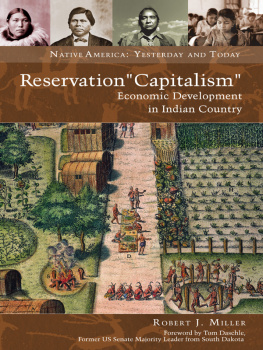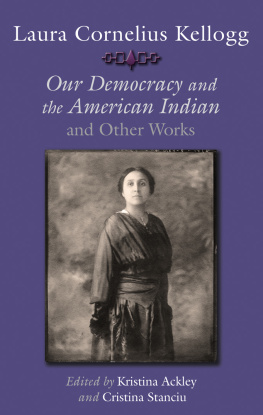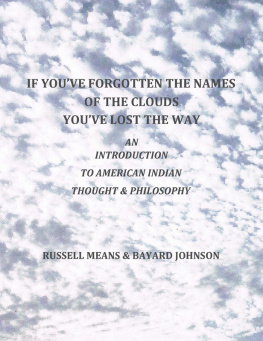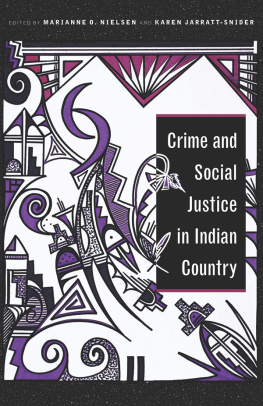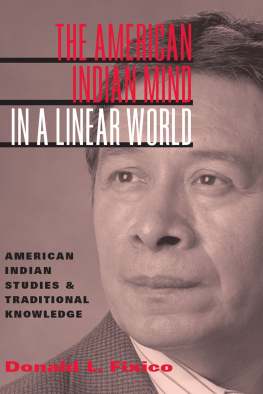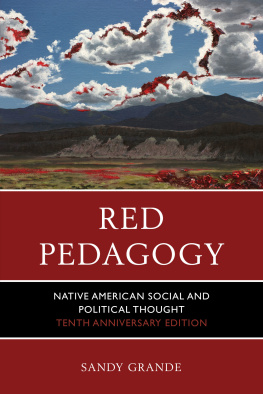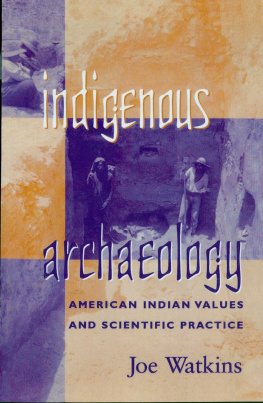ISBN for this digital edition: 978-0-8263-5059-6
2011 by the University of New Mexico Press All rights reserved. Published 2011 Printed in the United States of America
The Library of Congress cataloged the printed edition as follows:
Re-creating the circle : the renewal of American Indian self-determination / edited by LaDonna Harris, Stephen M. Sachs, and Barbara Morris.
p. cm.
Includes bibliographical references and index.
ISBN 978-0-8263-5057-2 (cloth : alk. paper) ISBN 978-0-8263-5059-6 (electronic)
1. Indians of North AmericaPolitics and government. 2. Indians of North AmericaGovernment relations. 3. Indians of North AmericaSocial conditions. 4. Self-determination, NationalNorth America. 5. Political participationNorth America. I. Harris, LaDonna. II. Sachs, Stephen M., 1938 III. Morris, Barbara, 1959
E98.T77R45 2011
323.1197dc22
2011005734
Introduction and Acknowledgments
LaDonna Harris, Stephen M. Sachs, Barbara Morris, Deborah Esquibel Hunt, Gregory A. Cajete, Benjamin Broome, Phyllis M. Gagnier, and Jonodev Chaudhuri
Re-creating the Circle is a collective undertaking by Indian people and their allies that focuses on American Indian and Alaska Native self-determination: the returning of Indigenous peoples and people to effective sovereignty, self-sufficiency, and harmony, that they may revert to living well in their own communities while partnering with their neighbors, the nation, and the world for mutual advancement. We have carried out this project in an Indigenous way, by weaving the perspectives and styles of individual contributors into a larger whole that provides a broader understanding of the issues and events than we could have achieved if we had compiled separate statements. We took this approach because American Indian affairs are extremely complexso much so, in fact, that no one person can have a complete perspective or full understanding of them. We can provide a thorough analysis only through a dialogue of multiple voices. This traditional Native way of approaching lifes important issues, as chapter 1 shows, is increasingly being taken in the contemporary world, where, for example, participatory workplaces increase quality, productivity, and efficiency though team process, and physicians and other technical experts find functioning in teams necessary to produce satisfactory results.
This book arose from a series of collaborations that began in 1992 to develop articles and papers on a variety of interrelated topics. Our elder and advisor has been LaDonna Harris (Comanche), founder and president of Americans for Indian Opportunity (AIO) and a leading catalyst of progress in Native American affairs and policy for more than four decades. This volume is offered as a tribute to her continuing contribution to improving the lives of Native and other peoples; the issues the book discusses are among those in which she has played an important collaborative role in attaining major advances. Stephen Sachs presents a perspective on her career and approach in chapter 6. Harris took the lead in developing the theme of each chapter in consultation with the volume editors, and she provided guidance and specific input on their revisions. Thus, we designate her as this volumes mentor and editor.
Two volume editors were involved in drafting the book and, along with Harris, in editing the entire work. Stephen Sachs, professor emeritus of political science at Indiana UniversityPurdue University Indianapolis and editor of the online journal IndigenousPolicy, served as coordinating editor of the project and was involved in the drafting of all of the chapters. Barbara Morris (Comanche and Cherokee) served as a coauthor of chapter 3 and shared in the editing of the entire volume. She is professor of government and provost and vice president for academic affairs at Fort Lewis College in Durango, Colorado, and has long been involved in the leadership of the American Political Science Associations (APSA) Race, Ethnicity and Politics section, including serving as co-president in 19981999.
Five contributing authors were involved in the writing and editing of one or more sections of the book. Deborah Esquibel Hunt (whose maternal grandmothers are Cherokee) is a project officer at the American Indian College Fund. She has served Jefferson County Schools as program coordinator of the Title VII Indian Education Program at the Office of Educational Equity in Golden, Colorado, and is a former assistant professor of social work at Highlands University in Las Vegas, New Mexico. She partnered in drafting and editing parts of chapters 2, 5, and 6 and was the initial drafter of the section of a paper that was developed into section 3 of chapter 5, concerning healing individual and community dysfunction resulting from colonialism and appropriately working with and serving Indian communities and people.
Gregory A. Cajete (Tewa), Santa Clara Pueblo, New Mexico, director of Native American Studies and associate professor in the College of Education at the University of New Mexico, drafted the major portion of the Indian education section in chapter 5 and shared in editing the entire section. Benjamin J. Broome, currently professor of communications at Arizona State University, while on the faculty of George Mason University was one of the facilitators in the inclusive participatory strategic planning process the Comanche used to build harmonizing community consensus that is discussed in chapter 4, section 1, and he cooperated in the drafting of that section. Phyllis Gagnier (Algonquin) provided the first portion of the title of this book (Re-creating the Circle), coauthored part of the education section in chapter 5, and assisted with editing several parts of the book. She is the creator of From the Heart Training and Consulting. She has worked with numerous Indian nations on educational development, nonviolent conflict resolution, and cultural projects, including the development of the Telly Awardwinning video production FromtheHeartofaChild, about substance-abuse intervention, and the video production AweeShaNoTsa (My Child Will Return to Me). Jonodev Osceola Chaudhuri (Muscogee), chief justice of the Muscogee (Creek) Nation Supreme Court and an appellate judge for the San Manuel Band of Serrano Mission Indians, as well as a practicing attorney and former judge for two other tribes, collaborated in writing chapter 4, section 2, concerning Indian nations indigenizing their dispute resolution, legal process, and law.
We are extremely appreciative of the assistance of several people in developing Re-creatingtheCircle. Michael Chapman, former special assistant to the assistant secretary of the interior for Indian affairs, and Faith Roessel, former coordinator of the Administration Working Group on American Indians and Alaska Natives, made extremely helpful comments and provided much useful information concerning the building of government-to-government relations between the federal government and Indian tribes, discussed in chapter 3. Jeff Corntassel, associate professor in the Indigenous Governance Programs at the University of Victoria, in Victoria, British Columbia, contributed important research and editing ideas to the drafting and revising of chapter 3 and made useful comments for the development of several sections of the book. Sharon OBrien, professor of Indigenous Native Studies at the University of Kansas, undertook a thorough reading of the entire manuscript and contributed many helpful comments for improving the text. Edgar Sachs read the various drafts of all the chapters, providing numerous editing suggestions throughout this volume. Leah Ingraham assisted us in obtaining American Indian and Alaska Native health statistics and made a number of useful suggestions. Dianne Russell copyedited the manuscript, improving the presentation, and Bonnie Cobb compiled the bibliography. Robert Swanson compiled the index.



